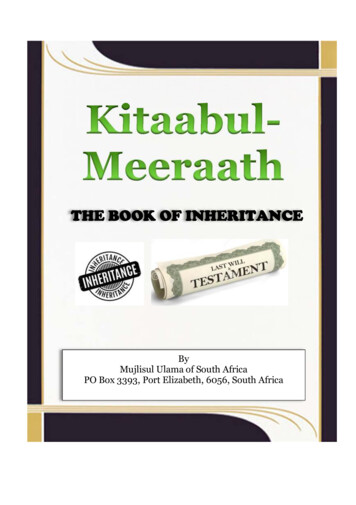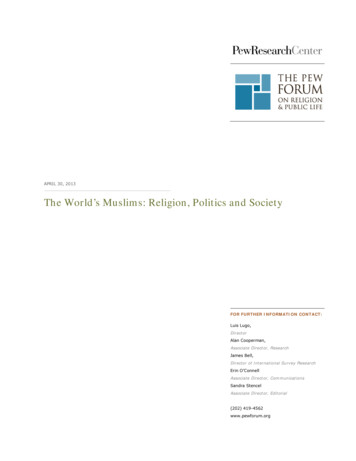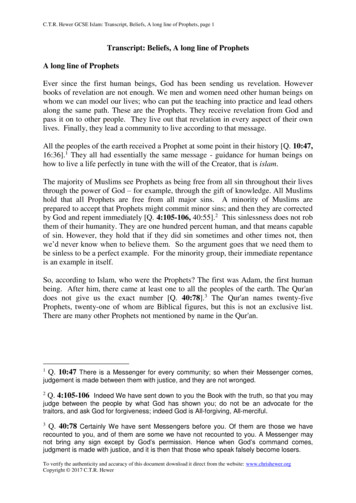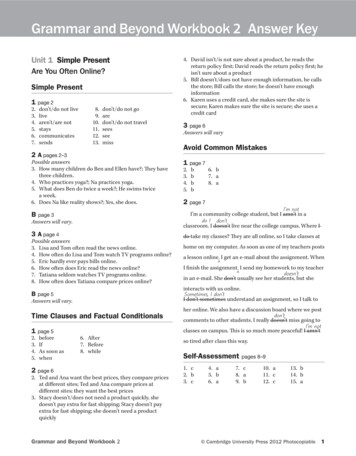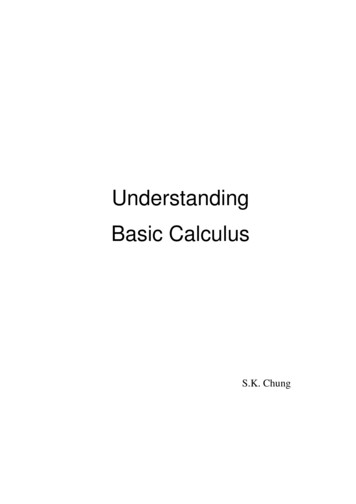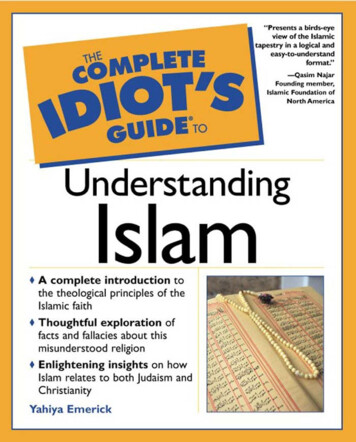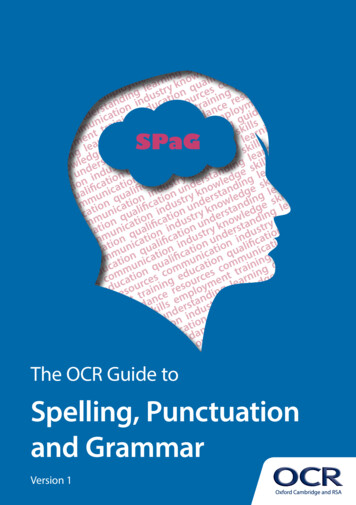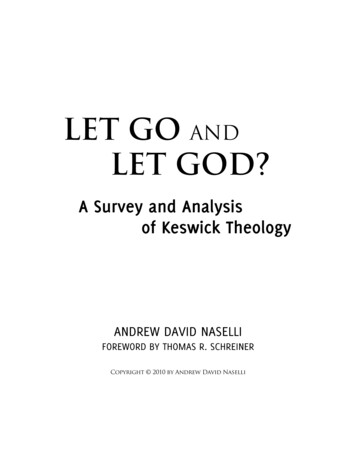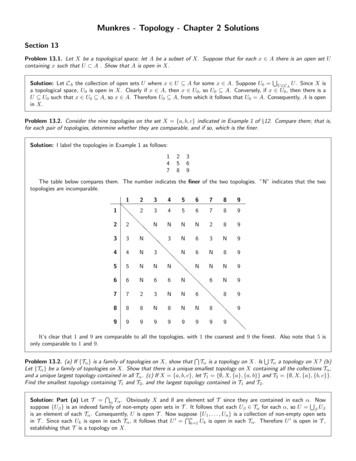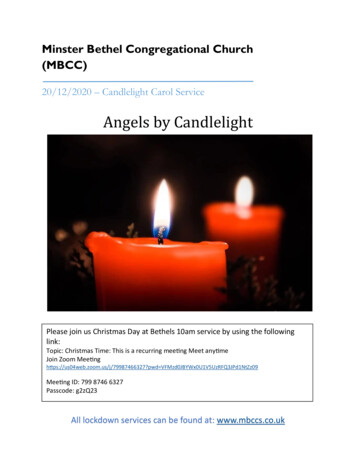
Transcription
The Islamic Foundation (new Engli'h vcr,jon) 19X511406 A.H.ISBN 0 86037 1573 (PB)ISBN 0 86037 1581 (HB)Editor: Khurram MuradCover illustration: Rashid RahmanPublished by: .The Islamic Foundation,223 London Road,Leicester LE2 IZE, United KingdomBritish Library Cataloguing in Publication /JatoMawdudi, Abul A'iaLet us be Muslims.1. IslamI. Title11. Murad, Khurram297 BPI61.2ISBN 0·86037·158·1ISBN 0·86037·157·3 Pbk.i)" ! IH:. ./ 'N':. :.l.,J'J\ J \ "JI tjyJl u. 1 . '4 1l.d1 .I Iw .,.lI- 1 l.:!".lJI.J .,,\All jYJ ".:.;I loT'! "'; )I 00"0 . .,. . ." : . WI i)b 1!1T'T'tM .,.slL t1tVY\T' t10'AIA.A;u.T' A tOAy\ II T 1AVT'VOT;,;.,-1I t1T T'tv .,, )I.;. ISole Distributor in the Middle East:INTERNA TIONAL ISLAMIC PUBLISHING HOUSEI. I. P. H.Publl&hlng And Distributing Istamic Books And Tapes In 70 LanguagesHEAD OFFICE: P.O.Box 55195· Riyadh 11534· Saudi ArabiaTel: (966·1) 4650818·4647213· Fax: 4633489BOOK SHOPS: Riyadh 1·46293471Jaddah2·6673752t Khobar3·8945821
ContentsIntroduction by Khurram MuradPreface to the First Edition1343PART I: IMAN471. Knowledge, the First StepAllah's Greatest Gift 47Is Islam a Birthright? 48No Mere Verbal Profession 49No Islam Without Knowledge 49Dangers of Ignorance 50Acquire Knowledge 512. Between Islam and Kufr53Muslims or Kafirs? 53Knowledge and Actions 54Why Are Muslims Humiliated Today?Desire For Knowledge 593. How Muslims Treat the.Qur'in5661Irreverence and Misuse 61Incomprehensible Contradictions 62The Consequences 64No Islam Without Submitting to the Qur'[m4. True Meaning of Iman69Difference the Kalimah Creates 69365
Is Mere Utterance Enough? 70Meaning of the Kalimah 71Covenant With Allah 72Accepting the Prophet's Leadership 73Obligations of Commitment 74Our Behaviour 765. Why is the Kalimah Unique? 77The Parable 77Two Kinds of Trees 78Characteristics of the Kalimah Tayyibah 79Characteristics of the Kalimah Khabithah 80Contrasting Results 81Why Are Believers in the Kalimah NotFlourishing? 82Are Followers of the Kalimah KhabUhahProspering? 836. Why Believe in the Kalimah? 85Success in the Hereafter 86This-world and That-world 86Success in That- World 87True Purpose of the Kalimah 88What Does the Kalimah Teach Us? 89Actions Must Accord With Knowledge 89PART II: ISLAM7. The False Gods 93What is Kufr and Islam? 93Islam: Total Surrender 94Three Reasons for Going Astray 95Self-worship - Society and Culture - Obedienceto Human BeingsCondition of Muslims Today 998. Can We Call Ourselves Muslims?A True Muslim 1034103
What is Hypocrisy? 104Serving the Self - Adherence to Society andCulture - Imitating Other PeopleThe True Faith 106A bstinence From Alcohol - Confession of Crime- Severance of Familial Ties - Giving UpCultural Norms and CustomsThe Way to God's Pleasure 109Muslims of Today 1109. Are We True Muslims?IIITwo Types of Islam 112Legal Islam - True IslamTwo Kinds of Muslims 114Partial Muslims - True MuslimsWhat Kind of Muslims God Desires 115Supreme Loyalty to Allah 116Where Do We Stand? 11710. Why Obey God?119Our WeI/-being 119Obeying Others Besides Allah 120The Only True Guidance 122How to Benefit 123No Blind Obedience 12411. Difference Between Din and Shari'ah125Meaning of Din 125Meaning of Shari'ah 128Nature of Differences 129Juristic Differences Between Muslims 130Ignoring the Nature of Differences 131Sectarianism 13313512. True Meaning of 'IbadahMeaning of 'Ibadah 136Misunderstanding 'Ibadah 137'Ibadah, Lifelong Service 1395
PAR T III: SALAH13. Meaning and Blessings of the PrayerRemembering God 145Constant Reminder 147Sense of Duty 148God-consciousness 149Knowledge of God's Law 150Collective Life 15114514. What We Say in the Prayer 153Adhan and its Effects 153Wuqit': Ablution 155Niyyah: Intention 155Tasbil;: Glorification 156Ta'awwudh: Seeking Refuge 156Bismillah: In His Name 156Ijamd: Praise and Thanks 156The Qur'an Reading 157Surah al- 'A rSurah al-Ma 'unSurahaf-HumazahRuku': Bowing Down 160Sujud: Prostration 160At-ta iyyat: Salutation160SaNa 'ala 'n-nabiy: Blessings Upon the ProphetSeeking Protection 162Salam: Greetings 162Du'a' qunitt 163Character-building 16415. Blessings of the Congregational PrayerPrivate Worship of God 165Assembling on One Call 167Purposeful Assembly 167Fellowship 168The Sacred Purpose 168Brotherhood 169Uniformity in Movements 1696165161
Uniformity in Prayers 170Leadership 171Nature and Qualities of Leadership 171Piety and Virtue -- Majority Representation Sympathy and Compassion - Vacating OfficeObedience to Leaders - Criticizing andCorrecting Mistakes - No Obedience in Sin16. Has the Prayer Lost its Power?175Parable of the Clock 175Aim of Muslim Ummah 176Wholeness of Islamic Teachings 177Abusing the Clock 178Why Worship Rites are Ineffective 179Our Deplorable Condition 180PART IV: SAWM17. Meaning and Blessings of the Fasting183Life of Worship 183Rituals Lead to a Life of Worship 184How Does Fasting Develop Us? 184Exclusively Private Worship - Sure Sign of Faith- Month-long Training - Practising Obedience- Communal FastingWhere Are the Results? 18818. True Spirit of the Fasting 189Spirit and Form 189The Outward Replaces the Real 190Wrong View of Worship 191Fasting as a Way to Piety 192Conditions of True Fasting 192Abstention From Falsehood - Faith and Selfscrutiny - Shield Against Sins - Hunger forGoodness7
PART V: ZAKAH19. Fundamental Importance of ZakahMeaning oj Zakah 197Zakah, a Test 198Early Practice 198Categorical Imperative 200The Sign oj Faith 201Foundation oj the Ummah 202Conditions Jor God's Help 203Warning to Muslims 203Fate oj Zakah DeJaulters 20419720. Meaning of Zakah 207Becoming God's Friends 207Wisdom and Understanding - Mora! Strength Obedience and DutifulnessSacrificing WealthRequirementsJor Admittance to God's Friendship 210Large-heartednessMagnanimitySelflessnessPurity oj HeartGiving in AdversityGiving in AJfluenceGiving Jor Allah AloneStressing BenevolenceAmassing WealthMaking ExcusesSpending Reluctantly andResentJully - Considering Spending a Fine NiggardlinessThe Real Test 21421. Zakah, a Social Institution 217Allah's Unique Beneficence 217Man's Selfishness 218What Selfishness Leads To 219Individual and Collective Welfare 220What is the Solution? 22222. General Principles of Spending 223Remembrance of God 223Spending in the Way oj Allah 224Essential Prerequisite to Guidance 225Spend Only to Please Allah 2268
Do Not Stress Your Benevolence 227Give Only Good Things 227Give Unobtrusively and Secretly 228Guard Against Misuse 228Do Not Harass Debtors 228Take Due Care of Family 229Give to the Deserving 22923. Specific Injunctions of Zakah 231Produce of the Earth 231On Wealth and Financial Assets . 232JewelleryWho Are Entitled to Receive Zakah 234Fuqara ': the poor - Masakin: the destitute andneedy - 'Amilina 'alayha: who administerZakahMu 'allafatu 'l-qulub: who need to beFi 'r-riqab: freeing from bondagereconciledAI-gharimin: overburdened debtors - Fi-sabW'lIah: in the way of AllahIbnu's-sabi I: travellersOther Important Principles 236Need For Collective System 238PART VI: HAJJ24. Origin and Significance of Hajj 243Life and Mission of the Prophet Ibrahim 243Ibrahim's Times 244Commitment to the Truth 245Tribulations and Calamities 246Migration 247Raising a New Generation 247The Greatest of Trials 248The Universal Islamic Movement 249Lut in Sodom - Isl}aq in Palestine Construction of the Ka'baPrayers of Ibrahim 2509
25. Restoration of True Hajj 253Idol Worship Among Ibrahim's Descendants 253How Corrupted Hajj Became 254A Yearly Carnival - Perverse Rites - Sacrilegeof Sacred Months - Self-imposed RestrictionsRestoration of Hajj 256Fulfilment of Ibrahim's Prayer - Revival ofIbrahim's Ways - End of Idolatry - Prohibitionof Indecent Acts - Bragging and Showing Off End of Ostentatious Generosity - Spattering ofBlood and Flesh Banned - Prohibition ofPerverse Rites - Changing the Months of HajjFor.bidden - Hajj Provisions Made Obligatory Permission to Work During Hajj - End of OtherCustoms - Fixing BoundariesEnsuring Peaceand SecurityImportance of Hajj 26126. Renewal of Self 263The Journey 263Virtue and Piety 264Ilyam and its Conditions 265Talbiyyah: the Cry of Response 265Tawaj' Walking Round the House 266Sa't: Hurrying Between ffafo' and Marwah 267Wuquf (Stay) at Mina', 'Arafot and MuzdaliJah 268Rami limar: Stoning the Pillars 268The Impact of Hajj 270Hajj, a Collective Worship 27127. Renewal of Society 273Growth in God-consciousness 273A Season of Reawakening 274Inspiring Spectacle of Unity 275Greatest Movement for Peace 276Centre of Peace and Equality 277Our Lack of Appreciation 279Deriving Full Benefit From Hajj 28110
PART VII: JIHAD28. Meaning of Jihad285The Ultimate Objective 285Root of All Evil 286The First Step 287Origin of Corrupt Rule 288God's Lordship Over Man 290Temptation of Power 291Rituals, a Training Course 291Governments Run by God-conscious People29. Central Importance of Jihad295Din, Shari'ah and 'Ibadah 295Duality of Din 296Every Din Wants Power 297Popular SovereigntyMonarchyDin of Islam 299Jihad in Islam 300Recognizing True Believers 302Change Only Through Struggle 302Preface to the Eighth ReprintIndex of Quranic Verses30911292305British Rule
IntroductionISayyid Abul A"Ia Mawdudi's Khu(ubat, of which Let UsBe Muslims is the new and edited English translation, is noordinary book.A collection of ordinary, familiar themes and plain truths,expounded before ordinary, illiterate people in plain wordsfrom their everyday language, it has, by the mercy of Allah,stirred more hearts and impelled more lives to alter theircourse to live in commitment to their Creator than any of hismore erudite works. Many, I am sure, would share thisimpression of mine who like me have been led by his inspiringwritings to join the cause of Allah. For who can forget thosegatherings where the participants often reminisced aboutthings that had brought them to the Islamic movement. Asone person after another rose to tell his story and mentionedSayyid Mawdudi's writings, I still vividly recollect, oneanswer overshadowed all others: the Khu{ubat.To express my own indebtedness to this book, I can do nobetter than to confess that I have now been reading it fornearly four decades and every time I have found it as freshand inspiring as ever. Even today, I find myself speaking andwriting, without the least embarrassment, words and ideasfrom the Khu(ubat, as if they were my own.How did this book come into being? As Sayyid Mawdudi13
LET US BE MUSLIMStells in his Preface, soon after migrating to Darul Islam, nearPathankot (now in the Punjab, India) - on 16 March, 1938- he started to gather the nearby villagers for the FridayPrayers. To them, in every congregational address(Khu{ubah), he tried to explain the essential message, thebasic teachings, and the spirit of Islam. Those addresses werecollected and published as Khu(ubat.First published in 1940, since then it has been published invarious forms and languages. A popular series has been thatof six separate booklets - Haqiqat-i-Iman, Haqiqat-i-Is/am,Haqiqat-i-Sawm-o-Salat, Haqiqat-i-Zakat, Haqiqat-i-Hajj,Haqiqat-i-Jihad. Translations in Bengali, Hindi, Tamil,Malayalam, Gujrati, Telgu, Sindi, Pushto and many othersubcontinental languages have also been made and publishedsince the early 1950s. The English translation came out thirtyfive years later under the title The Fundamentals of Islam(Islamic Publications, Lahore, 1975). In all these differentforms and languages, it has gone through innumerablereprints and is being constantly reprinted from many places.Many organizations, even individual admirers, have published its parts for mass distribution. Yet its need remains asfresh and its demand as high as ever.Sayyid Mawdudi's impact on the contemporary Muslimworld is not to be measured by the sale of his books, great asthey have been. It is doubtful if any other Muslim writer ofour day has so many readers, or is so avidly read, but what isimportant is that his sincere, convincing and passionate voicehas left indelible imprints on the minds and lives of hisreaders. The real measure of his impact, therefore, is theemergence of whole new generations of men and women whohave been inspired by him to lead lives of meaningful faith,Iman, in Allah, His Messenger, and His Book, and ofdedicated struggle, Jihad, in His cause. No doubt his examplein launching and leading a major Islamic movement hasplayed a crucial role in this process, but it is his writingswhich have made a greater impression, deep and lasting, farand wide.14
INTRODUCTIONOf all those writings, Sayyid Mawdudi's words inKhu{uM/.though spoken in the narrow confines of a mosque in a farflung part of the world, have exercised an influence very farand beyond the time and place in which they were firstspoken. They have found a response in the hearts and mindsof their readers in true proportion to the sincerity and depthof his message and purpose. They have led many to recognizetheir inner inconsistencies and make their faith and commitment sincere.Here, in Let Us Be Muslims, then, are the words whichhave touched many hearts and evoked many responses. Whatfills them with life and power? What makes this bookextraordinary?For, on the face of it, what Sayyid Mawdudi has said inthese addresses is very ordinary and commonplace; indeed soordinary that many readers might, after one quick look, wantto put the book away, without reading any further. Is this notthe same stuff, they would say, which we hear, day in dayout, from our pulpits? Obey Allah and His Messenger, prayand fast, and everything is going to be alright.To such readers I would say: let us together explore, atsome length, what Let Us Be Muslims means to say.Read the book, and you will find that even ordinary things,once placed in Sayyid Mawdudi's discourse, acquire quite anextraordinary quality, or, at least, in our time, that qualityhas become extraordinary. This is because he makes thosewords breathe the same sense and purpose, as against theirmerely lexical or cultural meanings, which they are given inthe Qur'an. Thus moulded afresh by the Quranic messageand burnt in the crucible of his heart, the very things whichlook so lifeless and irrelevant to life, such as Iman and Islamand the five pillars, acquire a life and revolutionary ardourthat they must have had when they were originally proclaimedand instituted. Then, the placid world of our beliefs andpractices which we had always taken for granted begins totumble down. Then, we begin to find the will and courage to'be Muslims'.15
LET US BE MUSLIMSEqually extraordinary is his style, the way he says thesethings.Sayyid Mawdudi was not the traditional preacher. Hisvoice did not roar in the air, nor did his body shake on thepulpit. He did not employ racy anecdotes, nor did he chantpoetry. Yet his voice, in this book, has the quality whichmakes it rise from the lifeless, printed pages and penetrateour hearts.Let us examine more closely, then, both his direct butpowerful style and simple but profound message that makethis book one of his best.IIWhat gives Sayyid Mawdudi's voice the quality that makesit penetrating and irresistible? How does it acquire the powerto quicken hearts and galvanize lives?Obviously the primary force is the nature of his message,its truth and simplicity, and his sincerity and passionate conviction of its relevance to real life. But, no less important is themanner in which he communicates his message. The secret ofhis persuasive power therefore lies simply in that he hassomething important and urgent to say and he says it sincerely,clearly and passionately.Firstly, he speaks to people in their 'language', a languagethat makes his message lucid and luminous. His language andlogic, his idiom and metaphors, all are plain and simple,rooted in the everyday life of his audience. They are not derivedfrom speculative philosophy, intricate logic, or mysterioustheology. For, sitting before him were ordinary folk andalmost illiterate farmers and servicemen. They knew neitherphilosophy nor theology, neither history nor politics, neitherlogic nor rhetoric, nor even the chaste and scholarly Urdu he,16
INTRODUCTIONuntil then, always used to write and speak. He therefore usc' words which they used in their common life and couldunderstand well, employs a logic which they could easilycomprehend, and coins metaphors which could make themrecognize reality through their everyday experience.Sayyid Mawdudi's chief concern is that real Iman whichwill find acceptance in the sight of Allah, which will bringrewards of dignity and success in this world as well as in theHereafter. See how with a simple example he is able todemonstrate that such Iman cannot be attained by mere verbalprofession, it must be lived by: 'Suppose you are shivering incold weather and you start shouting "cotton quilt, cottonqUilt!" The effect of cold will not be any less even if yourepeat these words all night a million times on beads or arosary. But if you prepare a quilt stuffed with cotton andcover your body with it, the cold will stop.' 1Nor can it be a birthright, that he establishes with a plainrhetoric question: 'Is a Muslim born a Muslim just as a HinduBrahman's son is born a Brahman, or an Englishman's son isborn an Englishman, or a white man's son is born a whiteman . .' 2 Obviously, even an illiterate man would say, No.Again, look how through an argument which derives itsforce from the everyday experience of his addressees SayyidMawdudi convincingly shows the inextricable link between alife of faith and righteousness in this world and, as its consequence, a life of eternal bliss in the next. As they were farmers,what could serve better as an example than a crop. 'If yousow wheat, only wheat will grow. If thorns are sown, onlythorns will grow. If nothing is sown, nothing will grow.' 3Therefore, 'if you follow his [the Prophet's] way, you willreap a fine harvest in the Hereafter, but if you act against hisway you will grow thorns in this world and reap only thornsin the Hereafter.' 4Secondly. clear and direct reasoning imparts to SayyidMawdudi's discourse a measure of economy and grace whichis quite unusual. In very few words he conveys many important themes, all beautifully reasoned. Every word, every17
LET US BE MUSLIMSargument, every example does its duty; they make his readersuse their reason and commit themselves wholeheartedly to thetask of 'being Muslims'.This appeal to reason, thirdly, is one of the most outstandingcharacteristics of Sayyid Mawd udi' s discourse. Howeverordinary and illiterate his addressees may be, for him they areresponsible, intelligent, and reasonable people. They are supposed to think for themselves, and they are capable of doingso. That is how God has made them. That is why Sayyid Mawdudi does not treat us as objects to be manipulated by cheaprhetoric and non-rational appeals. Instead, he persistentlyappeals to our reason with cogent reasoned arguments.For this purpose, he again and again confronts us withquestions rather than dogmatic statements. These questionsare artful premises from which we can easily deduce thenecessary conclusions, or they reinforce his argument, or theyserve as conclusions which, though irrefutable, we are stillfree to accept. The question-answer style, constantlyemployed thoughout the book, turns his discourse into adialogue rather than a monologue. Thus we become equalpartners in his explorations instead of remaining passivereceivers of his findings.For example: Iman implies the possibility of Kufr. The ideathat a Muslim is different from a Kafir is deeply ingrained inour minds. On the basis of this firmly-held notion SayyidMawdudi drives home the true nature of Iman. 'Does it meanthat if a Kafir has two eyes, a Muslim will have four? Or thatif a Kafir has one head, a Muslim will have two? You will say:"No, it does not mean that".' 5 We all think that Muslimswill go to Heaven and Kafirs to Hell. But Kafirs, he appealsforcefully to our sense of fairness, which is inherent in everydecent human being, 'are human beings like yourselves. Theypossess hands, feet, eyes and ears. They breathe the same airas you, drink the same water and inhabit the same land. TheGod who created you also created them. So why should theybe ranked lower and you higher? Why should you go toHeaven and why should they be cast into Hell?'. 618
lNTRODUCTlONObviously, a Kafir is a Kafir because he 'does not understand God's relationship to him and his relationship to God',nor, therefore, does he live by it. But, Sayyid Mawdudi asksus to think, 'If a Muslim, too, grows up ignorant of God'swill, what ground can there be to continue calling him aMuslim rather than a Kafir?'. 7 Now he leaves it to us toanswer the unpleasant but crucial and unavoidable questionwhich must follow as its conclusion: 'Now, in all fairness, tellme: if you call yourselves Muslims but in fact are as ignorantand disobedient as a Kafir, can you in reality be superior tothe latter merely on the strength of bearing different names,wearing different clothes and eating different food? Can youon this basis be entitled to the blessings of God in this worldand in the Hereafter?' 8But, fourthly, Sayyid Mawdudi's argument is never the drybones of rational logic; it is always alive, a piece of flesh andblood, throbbing with emotion and feeling. The power of hisdiscourse is greatly heightened because he combines the plainand simple logic of everyday life with the emotional argument;we find both deeply intertwined at every step of his writing.He suffuses his rationality with passion, which is an equallyimportant constituent of our being. It is not the passion offrenzy, it is the passion which springs from sincerity andtruth.Put simply: his logic has the warmth of emotion, his emotionthe force of logic. Cool arguments joined with burningappeals, with ironic contrasts, with charming eloquence, soakinto the very depth of our existence. Together they hammerthe truth into our minds and provoke us to respond.His tone, too, is all along personal and intimate. He doesnot speak as an outsider who is delivering moral sermonsfrom lofty towers. He is part of us. He shares our agonies anddifficult decisions. That is why he is also always prepared tolay bare his innermost feelings and thoughts. It is thispersonal quality that never lets his discourse become wooden,that always accentuates the force of his appeal.Look how the foolish and ironic inconsistencies of our19
LET US BE MUSLIMSconduct towards the Qur'an are exposed in a convincinglyreasoned argument that shakes us to our foundations. Thefusion of rationality with feeling compels us to reflect uponour situation as well as awakens us to do something about it:Tell me: what would you say if somebody got a doctor'sprescription and hung it round his neck after wrapping itin a piece of cloth or washed it in water and drank it?Would you not laugh at him and call him a fool? Yet thisis the very treatment being given before your eyes to thematchless prescription written by the greatest of alldoctors . and nobody laughs! .Tell me: what would you think if someone who was illpicked up a book on medicine and began to read it,believing, thinking that this would cure him. Would younot say that he was deranged? Yet this is how we treatthe Book which the supreme Healer has sent for the cureof our diseases. 9Or, see how, after depicting the miserable situation inwhich we Muslims find ourselves today, he appeals to oursense of honour, our sense of justice, and thereby leads us tothink about the state of our Islam.Is this the blessing of Allah? If it is not - but rather asign of anger - then how strange it is that it is Muslimson whom it is descending! You are Muslims and yet arewallowing in ignominy! You are Muslims and yet areslaves! This situation is as impossible as it is for an objectto be white and black .If it is an article of faith with you that God is not unjustand obedience to God can never result in disgrace, thenyou will have to concede that there is something wrong inyour claim to be Muslims. Although you may beregistered as Muslims on your birth certificates, Allahdoes not base His judgements on what is written onpieces of paper. J 1I20
INTRODUCTIONAbove all, and fifthly, what matters most, what reallystartles and provokes us, what compels us to choose andrespond to the summons of our Creator, is the rhythm ofconfrontation that permeates Sayyid Mawdudi's entirediscourse. His rhythm is not that of narration and exhortation,or even mere persuasion. From a series of kernels of simpletruth, he expands his rhythm into one that persistentlychallenges and confronts us.The simple truths, in his hands, become the tools withwhich he makes us expose our inner selves, as well as theyprovide us with a powerful critique of our society. His purposeis not to preach to us, but to change us. He wants us to thinkfor ourselves and make our own choices. What startles us isthe way he lays bare the implications of what we have alwaysso placidly and lazily continued to believe; what provokes usis the way he divulges our inner contradictions andhypocricies, our incongruous, incomprehensible attitudestowards things we claim to value most.The above examples illustrate how everything that SayyidMawdudi says pulsates with the rhythm of confrontation.But nowhere does it stand out so sharply and powerfully aswhen he calls upon us to compare our lives and conduct withthose of Kafirs:Kafirs do not read the Qur'an and do not know what iswritten in it. If so-called Muslims are equally ignorant,why should they be called Muslims? Kafirs do not knowthe teachings of the Prophet, blessings and peace be onhim, and the straight path he has shown to reach God. IfMuslims are equally ignorant of these, how can they beMuslims? Kafirs follow their own desires instead of thecommands of Allah. If Muslims are similarly wilful andundisciplined, setting their own ideas and opinions on apedestal, indifferent to God and a slave to lust, whatright have they to call themselves Muslims? . . . [indeed] almost the only difference now left betweenus and Kafirs is that of mere name .21
LET US BE MUSLIMSI say 'almost' because there is, of course, a differencebetween us: we know that the Qur'an is the Book ofGod, . . . yet we treat it as a Kafir treats it. And thismakes us all the more deserving of punishment. Weknow that Muhammad, blessings and peace be on him, isthe Prophet of Allah and yet we are as unwilling as aKafir to follow him. IIThere are many reasons for these paradoxes. But onereason Sayyid Mawdudi explains in his characteristic style:'You know the damage caused if crops are burnt; you knowthe suffering which results from failure to earn a livelihood;you know the harm resulting from loss of property. But youdo not know the loss of being ignorant of Islam.' 12Finally, let us look at one especially exquisite extract fromSayyid Mawdudi's discourse which epitomizes all thedistinguishing characteristics of his style. Answering thequestion, has the Prayer lost its power to change lives, hepoints to the clock which was in front of his audience andwhich all of us have, and proceeds to explain why. Note thesimple but powerful argument and the beauty and grace oflanguage.Look at the clock fixed to the wall: there are lots of smallparts in it, joined to each other .If you do not wind it, it will not show the time. If youwind it but not according to the method prescribed, itwill stop or, even if it works, it will not give the correcttime. If you remove some of its parts then wind it,nothing will happen. If you replace some of the partswith those of a sewing machine and then wind it, it willneither indicate the time nor sew the cloth. If you keepall its parts inside its case but disconnect them, then nopart will move even after winding it .Imagine Islam like this clock . Beliefs and principlesof morality, rules for day-to-day conduct, the rights of22
INTRODUCTIONGod, of His slaves, of one's own self, of everything inthe world which you encounter, rules for earning andspending money, laws of war and peace, principles ofgovernment and limits of obedience to it - all these areparts of Islam . .[But now] . you have pulled out many parts of theclock and in their place put anything and everything: aspare part from a sewing machine, perhaps, or from afactory or from the engine of a car. You call yourselvesMuslims, yet you render loyal service to Kufr, yet youtake interest . which un-Islamic gadget is there thatyou have not fixed into the frame of the clock of Islam.Despite this you expect the clock to work when you windit! J3The parable of the clock not only serves to explain the'holistic' nature of Islamwhich no intellectual discussioncould have explained so'lucidly . but it also symbolizesSayyid Mawdudi's own contribution to Islamic resurgence:according each part of Islam its due place, infusing it with itstrue meaning, relinking all of them together.IIIWhat does Sayyid Mawdudi say? He talks, as we noted inthe beginning, about things which are central to Islam: faithand obedience, knowledge and righteous life, the presentworld and the world to come, the Prayer, Fasting, Almsgiving,Pilgrimage and Jihad. But is this not what every religiouswriter and preacher talks about? So, what is so unique abouthis discourse? The question is legitimate. Let us see if we cananswer it.23
LET US BE MUSLIMSNo doubt he explains and expounds their meanings andimport, too, in a manner which in itself is distinctive anduncommon. But more significantly, and this is central to theimportance of this book, he imparts a radical quality to allthese elementary everyday themes by renewing their originalintent and meaning and by making them relevant to our lives.How does he do that? Firstly, he restores each part to itsrightful place in Islam. Secondly, and this is his unique contribution, he restores the vital li
ordinary book. A collection of ordinary, familiar themes and plain truths, expounded before ordinary, illiterate people in plain words from their everyday language, it has, by the mercy of Allah, stirred more hearts and impelled more lives to alter their course to live in commit
